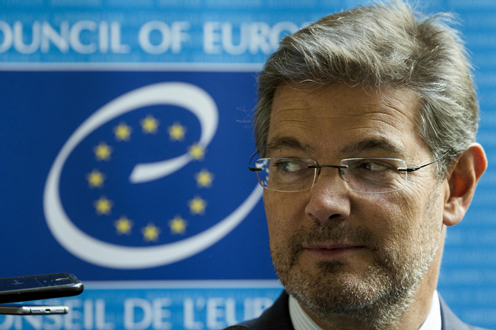2nd International Conference on Terrorism and Organised Crime
Rafael Catalá calls for greater cooperation between States to fight terrorism and international crime
News - 2017.9.21
Rafael Catalá, who highlighted the serious threat, both at a social and economic level, that international organised crime poses to global security, also underlined the need for all involved to join forces and step up the fight to prevent, contain and counter this phenomenon that is resorting to very sophisticated methods and taking advantage of globalisation and the development of information technologies.
For the Minister for Justice, this question presents three urgent challenges: the fight against terrorism and radicalisation, the fight against organised crime, and the fight against cyber-crime. To achieve this, it is necessary to deal with the presence of terrorism in cyber-space, since this has become the preferred medium for the development of criminal activities by abusing IT platforms and applications.
To combat this, and as a means of guaranteeing a suitable response of a criminal nature, Rafael Catalá referred to the need to strengthen procedural tools available to States on such issues as obtaining evidence in electronic formats, on which matter, according to the Minister for Justice, Spain has adopted a highly proactive approach. The minister highlighted the support offered by our country to the work of the Council of Europe in drawing up the Additional Protocol to the Convention on Cybercrime that will allow for increased cooperation to combat cyber-terrorism and other cross-border offences.
Rafael Catalá also underlined our country's leading position in the fight against the discourse of hatred, the fundamental source of conduct that leads to violent extremism and terrorism. In this regard, he referred to Jihadi terrorism as the most serious threat that democratic societies around the world are facing at this time, a scourge that must be countered through all the instruments legally available under the rule of law.
The Minister for Justice referred to the latest new features included in the Spanish Criminal Code, such as tougher sentences that may include life imprisonment with parole in the event of death or aggravating circumstances, such as the offence of the recruitment or indoctrination of people in a vulnerable situation, and in the event of the glorification or public justification of terrorism and the humiliation of victims through the use of information and communication technologies. The elimination of this illegal content has also been considered in order to prevent its dissemination.
The minister also highlighted the absolute disqualification of those sentenced for these offences, the disassociation of the concept of terrorism from the necessary membership of an organisation (lone wolves), the introduction of new criminal figures linked to publicity and propaganda through electronic means, the consideration of self-indoctrination as a criminal offence and the inclusion of the offence of foreign travel with the aim of receiving training and to carry out attacks in other countries upon their return.
Non official translation





